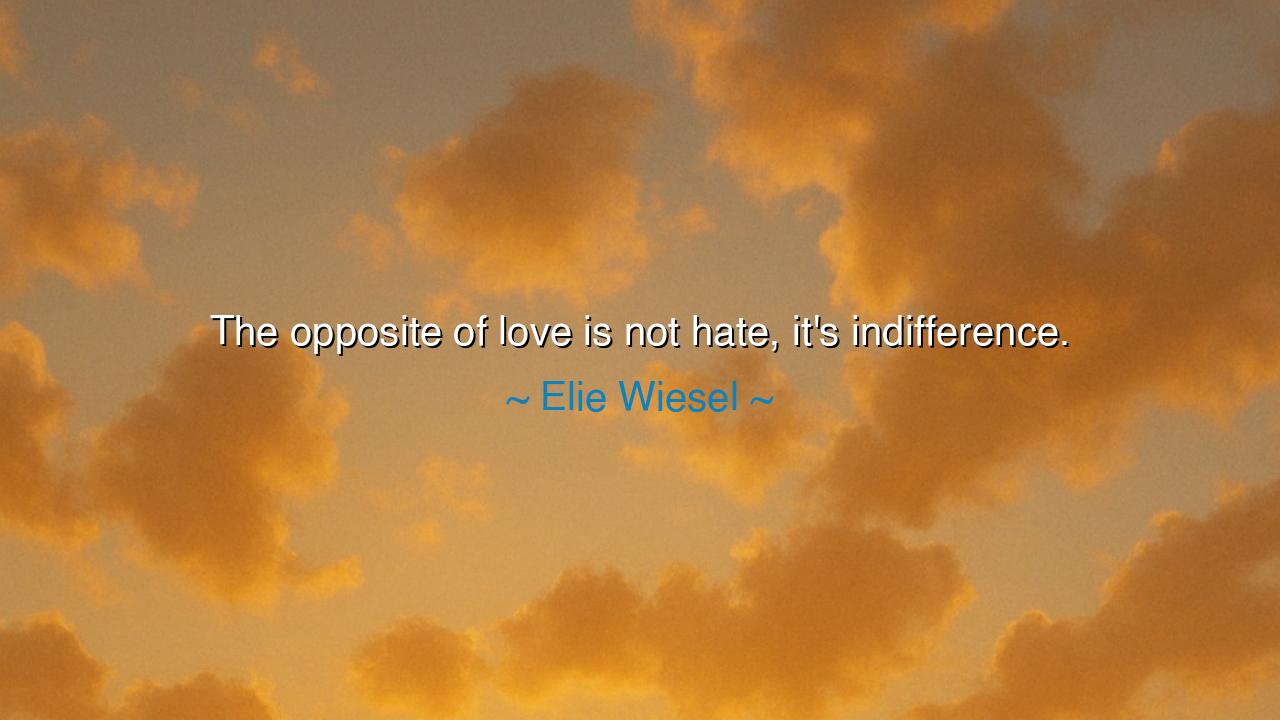
The opposite of love is not hate, it's indifference.






“The opposite of love is not hate, it’s indifference.” — Thus spoke Elie Wiesel, the survivor, the witness, and the conscience of a century that had forgotten its own heart. These words, forged in the fires of human suffering, carry the weight of both grief and revelation. Wiesel, who endured the unspeakable horrors of the Holocaust, understood that the greatest evil is not always born of hatred, but of apathy — the cold refusal to care. For hate, he said, still acknowledges the other’s existence; it burns with energy, however twisted. But indifference is the absence of all feeling — a silence of the soul that allows cruelty to thrive unchecked.
This quote comes from a speech Wiesel delivered in 1999 at the White House, during a lecture on the perils of indifference. Yet its origin lies much deeper — in the black night of Auschwitz and Buchenwald, where he saw millions perish while much of the world looked away. He had witnessed firsthand how ordinary people, by simply doing nothing, became instruments of destruction. He learned that indifference is not neutral; it is complicity disguised as peace. When good men turn away, evil grows bold. When compassion sleeps, injustice awakens. Thus, his words are both an accusation and a call to conscience — a cry that echoes through generations.
To understand the depth of his wisdom, one must grasp what indifference truly means. It is not mere ignorance or distraction, but the deliberate closing of the heart. It is the refusal to see suffering, the turning away from pain because it is inconvenient to feel. Wiesel believed that the human soul dies not when it is hated, but when it is forgotten. The child who suffers alone, the stranger who cries unheard, the oppressed who are denied even the dignity of attention — these are the victims not only of cruelty, but of indifference, that invisible poison of the modern age.
History offers countless witnesses to this truth. During the Holocaust, while millions were herded into camps and gas chambers, the world’s great powers delayed their response. Ships of Jewish refugees were turned away from safe harbors; neighbors looked out their windows and did nothing. The crime was not only in the acts of the murderers, but in the silence of bystanders. In contrast, those few who risked their lives to help — like Oskar Schindler, who saved more than a thousand Jews through courage and compassion — remind us that to love, even imperfectly, is to resist indifference. Schindler did not begin as a hero; he was a man transformed by empathy, proving that one heart awakened can change the fate of many.
Yet Wiesel’s teaching reaches beyond war and genocide. It speaks to the quiet indifference that creeps into everyday life — when we ignore the lonely, when we pass the hungry on the street, when we choose comfort over compassion. He warns that when we stop caring, we stop being human. Love and hate are both passions, but indifference is the death of passion itself. It is a soul grown numb. And when nations, communities, or individuals grow indifferent, injustice takes root not in violence, but in silence.
But take heart, for in this warning lies a path of renewal. Wiesel did not speak only to condemn; he spoke to awaken. If indifference is the death of the soul, then empathy is its resurrection. The cure for apathy is not rage, but responsibility — the willingness to feel, to act, to be moved by the pain and joy of others. The smallest gesture — a kind word, an open ear, a hand extended — becomes an act of rebellion against indifference. For every act of compassion rekindles the divine spark within humanity, the light that no darkness can extinguish.
Therefore, dear listener, let this truth settle deeply in your heart: to love is to pay attention. When you notice suffering and respond with mercy, you become a guardian of the world. When you refuse to look away, you become the voice of hope for the voiceless. Do not fear feeling too deeply — fear feeling nothing at all. For indifference, not hatred, is what allows evil to endure. Let your heart remain open, even when the world tempts you to close it. Choose care over comfort, and action over silence.
This, then, is the eternal wisdom of Elie Wiesel — that the measure of a life is not in what we achieve, but in what we refuse to ignore. The opposite of love is not hate, but indifference; for hate may wound, but indifference destroys the very possibility of healing. Let every generation remember his words as both warning and light: that only by loving, by caring, by refusing to look away, can we keep the world — and our own souls — truly alive.






AAdministratorAdministrator
Welcome, honored guests. Please leave a comment, we will respond soon